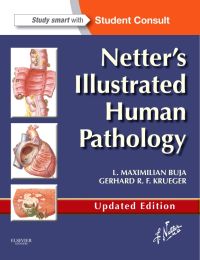Netter's Illustrated Human Pathology Updated Edition, 1st Edition
Gain critical insight into the structure-function relationships and the pathological basis of human disease with Netter's Illustrated Human Pathology. With a visually vibrant approach, this atlas provides clear and succinct representations of common human diseases by relating anatomical changes to the functional and clinical manifestations of disease and their underlying causes and mechanisms.
Updated throughout, it offers a superb complement to more comprehensive textbooks and presentations of pathology, including course syllabi. It can also be used as an adjunct for study of gross and microscopic pathology specimens in laboratory exercises, and makes a great review resource for students, medical residents, physicians and other healthcare professionals.
Gain critical insight into the structure-function relationships and the pathological basis of human disease with Netter's Illustrated Human Pathology. With a visually vibrant approach, this atlas provides clear and succinct representations of common human diseases by relating anatomical changes to the functional and clinical manifestations of disease and their underlying causes and mechanisms.
Updated throughout, it offers a superb complement to more comprehensive textbooks and presentations of pathology, including course syllabi. It can also be used as an adjunct for study of gross and microscopic pathology specimens in laboratory exercises, and makes a great review resource for students, medical residents, physicians and other healthcare professionals.
New to this edition
- Gain a superb visual understanding through more than 380 classic Netter and new Netter-style images, gross and microscopic photographs and tables.
- Reference information effortlessly with numerous tables throughout including 452 figures and 255 slides.
- Take your learning farther with Student Consult access.
Key Features
- Grasp and retain key pathologic concepts and conditions. Beginning with a concise summary of the various pathological processes and diseases, each chapter consists of illustrations of pathological processes and diseases accompanied by concise text aimed at clarifying and expanding the information presented in the illustrations.
Author Information


